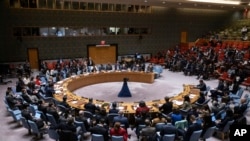ສົງຄາມຄັ້ງໃໝ່ ແລະຄວາມອຶດຢາກທີ່ເພີ້ມຂຶ້ນ ພ້ອມທັງຄວາມທຸກຍາກເນື່ອງຈາກສະພາບການທີ່ຮ້ອນຂຶ້ນຢູ່ໃນທົ່ວໂລກ ເຊິ່ງອົງການສະຫະປະຊາຊາດສາມາດແກ້ໄຂໄດ້ພຽງເລັກນ້ອຍເທົ່ານັ້ນ. ນັກຂ່າວ VOA ມາກາເຣັດທ໌ ບາເຊຍ (Margaret Besheer) ຕິດຕາມເບິ່ງກ່ຽວກັບອະນາຄົດຂອງອົງການສະຫະປະຊາຊາດ ຢູ່ໃນທົ່ວໂລກ ບ່ອນທີ່ຜົນກະທົບຂອງຕົນນັ້ນ ໄດ້ຫລຸດລົງ, ເຊິ່ງ ທິບສຸດາ ມີລາຍລະອຽດມາສະເໜີທ່ານ.
ໃນປີ 2023, ສົງຄາມ ຢູເຄຣນ ໄດ້ກ້າວເຂົ້າມາເປັນປີທີສອງແລ້ວ, ໂດຍບໍ່ມີທ່າທີວ່າ ສັນຕິພາບໃກ້ເຂົ້າມາ. ການກໍ່ລັດຖະປະຫານທາງທະຫານ ໄດ້ເຮັດໃຫ້ພາກພື້ນຂອງອາຟຣິກາຈໍານວນນຶ່ງບໍ່ມີສະຖຽນລະພາບ, ພ້ອມກັນນັ້ນ ສົງຄາມຄັ້ງໃຫມ່ ແລະສົງຄາມທີ່ຮ້າຍແຮງ ໄດ້ເກີດຂື້ນໃນຂົງເຂດ ຊູດານ ແລະ ພາກຕາເວັນອອກກາງ.
ອົງການສະຫະປະຊາຊາດ ປະສົບຜົນສຳເລັດພຽງໜ້ອຍດຽວໃນການຍຸຕິການນອງເລືອດດັ່ງກ່າວມານັ້ນ.
ທ່ານນາງອັນຈາລີ ດາຢາລ (Anjali Dayal) ເປັນອາຈານສອນດ້ານການພົວພັນສາກົນ ຢູ່ທີ່ມະຫາວິທະຍາໄລ ຝອດແຮມ (Fordham) ຂອງລັດນິວຢອກ ກ່າວວ່າ:
“ມັນເປັນການທ້າທາຍທີ່ສະເພາະເຈາະຈົງ, ເພາະວ່າ ຄວາມຂັດແຍ້ງໃນລັກສະນະທີ່ອົງການສະຫະປະຊາຊາດກໍາລັງປະເຊີນໃນປີແລ້ວນີ້ ເປັນບັນຫາຂັດແຍ້ງກັນແບບປະເພດທີ່ອົງການສະຫະປະຊາຊາດມີຄວາມພ້ອມໃນການຈັດການພຽງເລັກນ້ອຍເທົ່ານັ້ນ. ຊຶ່ງມັນເປັນຄວາມຂັດແຍ້ງກັນລະຫວ່າງບັນດາສະມາຊິກຖາວອນຈໍານວນຫຼາຍຂອງສະພາຄວາມໝັ້ນຄົງສະຫະປະຊາຊາດ. ແລະເມື່ອບັນດາປະເທດຕ່າງໆເຫຼົ່ານັ້ນມີສ່ວນກ່ຽວຂ້ອງ, ອົງການສະຫະປະຊາຊາດ ຈຶ່ງມີຂອບເຂດໃນການດຳເນີນການໜ້ອຍທີ່ສຸດ.”
ນັ້ນກໍຍ້ອນວ່າ ອັງກິດ, ຈີນ, ຝຣັ່ງ, ຣັດເຊຍ ແລະ ສະຫະລັດ ສາມາດໃຊ້ສິດໃນການຍັບຍັ້ງ ຫຼື ວີໂຕ້ ຂອງພວກເຂົາເຈົ້າ ເພື່ອສະກັດກັ້ນມາດຕະການລົງໂທດ ແລະ ເຄື່ອງມືອື່ນໆທີ່ສະພາຄວາມໝັ້ນຄົງສາມາດນຳໃຊ້ ເພື່ອຮັກສາສັນຕິພາບ ແລະ ຄວາມໝັ້ນຄົງ.
ໃນປີກາຍນີ້, ການແບ່ງແຍກທາງດ້ານພູມສາດການເມືອງ ໄດ້ເພີ່ມທະວີຂຶ້ນ ເນື່ອງຈາກສົງຄາມ ຣັດເຊຍ ໃນ ຢູເຄຣນ, ແລະນັບຕັ້ງແຕ່ເດືອນຕຸລາເປັນຕົ້ນມາ, ເຊິງວໍຊິງຕັນ ໄດ້ສະໜັບສະໜຸນອິສຣາແອລ ກ່ຽວກັບສົງຄາມຕໍ່ຕ້ານກຸ່ມຮາມາສ.
ທ່ານຣີຊາດ ໂກວານ (Richard Gowan), ຜູ້ອໍານວຍການໃຫຍ່ສໍາລັບກຸ່ມວິກິດການສາກົນ ຂອງອົງການສະຫະປະຊາຊາດ ກ່າວວ່າ:
"ແລະອາລົມຄວາມຮູ້ສຶກໃນສະພາຄວາມຫມັ້ນຄົງໃນປັດຈຸບັນນີ້ ແມ່ນສິ່ງທີ່ເປັນພິດໄພ."
ເລຂາທິການໃຫຍ່ອົງການສະຫະປະຊາຊາດ ທ່ານແອນໂຕນີໂອ ກູເຕເຣສ (Antonio Guterres) ບໍ່ສາມາດຂັດຂວາງຄວາມຮ້າຍແຮງນີ້ໄດ້ ໂດຍການຮຽກຮ້ອງໃນເດືອນທັນວາ ດ້ວຍການນໍາໃຊ້ມາດຕາ 99 ທີ່ບໍ່ຄ່ອຍເກີດຂຶ້ນຂອງກົດບັດສະຫະປະຊາຊາດ ເພື່ອກົດດັນສະພາໃຫ້ຮັບຮອງການຢຸດຍິງດ້ານມະນຸດສະທໍາໃນສົງຄາມ ອິສລາແອລ ແລະກຸ່ມ ຮາມາສ.
ສະຫະລັດ ໄດ້ຄັດຄ້ານການຮ້ອງຂໍຂອງທ່ານກູເຕເຣັສ, ແລະ ອິສຣາແອລ ໄດ້ຮຽກຮ້ອງໃຫ້ທ່ານລາອອກຈາກຕຳແໜ່ງ.
ມີຂ່າວຄາວທີ່ບໍ່ດີກວ່ານັ້ນ ສຳລັບຄວາມພະຍາຍາມໃນການຮັກສາສັນຕິພາບຂອງອົງການສະຫະປະຊາຊາດຢູ່ໃນຂົງເຂດດັ່ງກ່າວ.
ອົງການດັ່ງກ່າວຂອງສະຫະປະຊາຊາດ ທີ່ເອີ້ນວ່າ “ໝວກກັນກະທົບສີຟ້າ” ກໍໄດ້ສະເຫຼີມສະຫຼອງຂີດໝາຍຂອງການການດໍາເນີນງານມາໄດ້ຄົບຮອບ 75 ປີ ຂອງອົງການນີ້.
ແຕ່ວັນຄົບຮອບດັ່ງກ່າວ ມີຂຶ້ນໃນຂະນະທີ່ປະເທດມາລີ ແລະສາທາລະນະລັດປະຊາທິປະໄຕຄອງໂກ ຮຽກຮ້ອງໃຫ້ກອງກຳລັງຂອງອົງການສະຫະປະຊາຊາດອອກຈາກດິນແດນຂອງພວກເຂົາເຈົ້າ, ແລະໃນຂະນະທີ່ ເຮຕີ ໄດ້ຮຽກຮ້ອງໃຫ້ມີກອງກຳລັງສາກົນຊ່ວຍຮັກສາສະຖຽນລະພາບຂອງປະເທດຕົນ ແຕ່ບໍ່ແມ່ນອົງການສະຫະປະຊາຊາດ.
ໃນອາຟຣິກາ, ບັນດາຜູ້ນໍາຂອງປະເທດຕ່າງໆ ກໍາລັງພະຍາຍາມຫຼາຍຂຶ້ນ ເພື່ອດຶງເອົາບັນດາປະເທດໃນກຸ່ມພາກພື້ນ ມາຮັບມືກັບວິກິດການຢູ່ເຂດໃຕ້ຂອງທະເລຊາຍຊາຮາຣາ.
ອັນນີ້, ຄຽງຄູ່ກັບງົບປະມານປະຈໍາປີອັນໜັກໜ່ວງກ່ຽວກັບການຮັກສາສັນຕິພາບຫຼາຍກວ່າ 6 ຕື້ໂດລາ, ເຊິ່ງໄດ້ຜັກດັນໃຫ້ເກີດມີຄໍາຖາມກ່ຽວກັບປະສິດທິພາບ, ມູນຄ່າ ພ້ອມທັງຄວາມຈໍາເປັນ ສໍາລັບພາລະກິດຕ່າງໆໃນປັດຈຸບັນ ແລະອະນາຄົດ.
ຫົວໜ້າຝ່າຍດໍາເນີນງານດ້ານສັນຕິພາບຂອງອົົົົງການສະຫະປະຊາຊາດ, ທ່ານຊອນ ເພຍຣ໌ ລາຄຣົວສ໌ (Jean Pierre Lacroix) ກ່າວວ່າ:
“ຈົ່ງກ້າວໄປໜ້າ, ສິ່ງທີ່ພວກເຮົາຄິດ ພວກເຮົາຄວນເຮັດວຽກຮ່ວມກັນກັບບັນດາປະເທດສະມາຊິກເພື່ອໃຫ້ໝັ້ນໃຈວ່າ ມີການດໍາເນີນງານຮັກສາສັນຕິພາບຂອງອົງການສະຫະປະຊາຊາດ ເມື່ອໃດທີ່ພວກເຂົາເຈົ້າໄດ້ຮັບຄວາມຕ້ອງການ, ທີ່ຈະເໝາະສົມກັບວັດຖຸປະສົງນັ້ນ. ແລະໃນເວລາໃດທີ່ມີການບັງຄັບໃຊ້ກົດໝາຍ ບໍ່ແມ່ນການຮັກສາສັນຕິພາບ, ດັ່ງນັ້ນ ມັນກໍຈະບໍ່ແມ່ນໜ້າທີ່ສໍາລັບອົງການສະຫະປະຊາຊາດ ໃນການຮັກສາສັນຕິພາບ ເພື່ອຈະເຮັດການບັງຄັບໃຊ້, ແຕ່ມັນແມ່ນລັກສະນະຂອງປະຕິບັດການໃນຮູບແບບອື່ນໆ."
ຊ່ວງເວລາແຫ່ງຄວາມຫວັງອັນນຶ່ງ ມີຂຶ້ນຢູ່ທີ່ກອງປະຊຸມສະພາບອາກາດ ຄັອບ28 (COP28) ໃນນະຄອນດູໄບ, ເຊິ່ງເປັນຄັ້ງທໍາອິດທີ່ບັນດາຜູ້ແທນໄດ້ເຫັນດີນໍາກັນ ກ່ຽວກັບຄວາມຈຳເປັນເພື່ອກ້າວອອກຈາກການນໍາໃຊ້ເຊື້ອໄຟທີ່ມາຈາກຊາກສັດ ແລະຊາກພືດດຶກດໍາບັນທີ່ເປັນແຮງຂັບເຄື່ອນອັນສຳຄັນທີ່ເຮັດໃຫ້ເກີດພາວະໂລກຮ້ອນ.
ດ້ວຍການປ່ຽນແປງຂອງດິນຟ້າອາກາດທີ່ເຮັດໃຫ້ເກີດໄພທຳມະຊາດຮ້າຍແຮງຂຶ້ນ, ບັນຫາຂັດແຍ້ງຕ່າງໆ ແລະສິ່ງທີ່ເຮັດໃຫ້ເກີດຄວາມປະຫຼາດໃຈອື່ນໆຢູ່ໃນທົ່ວໂລກ, ໄດ້ເຮັດໃຫ້ອົງການສະຫະປະຊາຊາດຮຽກຮ້ອງໃຫ້ເພີ້ມທະວີການຊ່ວຍເຫຼືອດ້ານມະນຸດສະທຳຫຼາຍຂຶ້ນ.
ທ່ານອັນນາງຈາລີ ດາຢາລ ກ່າວອີກຄັ້ງນຶ່ງວ່າ:
“ພວກເຮົາເຫັນເຫດການ ໃນຊ່ວງເວລາທີ່ທາງການເມືອງໄດ້ຊຸດໂຊມລົງ ທີ່ຈະໄກ່ເກ່ຍບັນຫາຂັດແຍ້ງ ຫຼືວິກິດການດ້ານມະນຸດສະທຳຕ່າງໆນັ້ນ ໃຫ້ຫຼຸດຜ່ອນລົງ, ແຕ່ຍັງມີທ່າແຮງທີ່ບົ່ມຊ້ອນອັນແທ້ຈິງ ທີ່ຈະດໍາເນີນງານດ້ວຍຄວາມສຳຄັນ, ວຽກງານທາງດ້ານມະນຸດສະທຳທີ່ສຳຄັນຍິ່ງ. ແຕ່ວ່າ ຕ້ອງໄດ້ຮັບທຶນ; ຕ້ອງໄດ້ຮັບການສະຫນັບສະຫນຸນ, ເພື່ອໃຫ້ໄດ້ຮັບຜົນອອກມາທີ່ຍິ່ງໃຫຍ່ທີ່ສຸດ."
ໃນຫຼາຍທົດສະວັດທີ່ຜ່ານມາ, ຫຼາຍໆຄົນໄດ້ຮຽກຮ້ອງໃຫ້ມີການປະຕິຮູບຕໍ່ອົງການສະຫະປະຊາຊາດ, ໃນນັ້ນ ລວມມີການຂະຫຍາຍຜູ້ຕາງໜ້າຂອງສະພາຄວາມໝັ້ນຄົງ ເພື່ອຕອບສະໜອງຕໍ່ສະພາບຕົວຈິງໃນປັດຈຸບັນ.
ທ່ານຣີຊາດ ໂກວານ ຈາກກຸ່ມວິກິດການສາກົນ ກ່າວອີກຄັ້ງນຶ່ງວ່າ:
“ອົງການສະຫະປະຊາຊາດປະສົບກັບສະພາບເປັນອຳມະພາດ ໃນສົງຄາມເຢັນມາເປັນເວລາຍາວນານ. ດັ່ງນັ້ນ ສິ່ງທີ່ທາງອົງການກໍາລັງປະເຊີນກ່ຽວກັບວິກິດການ ບໍ່ໄດ້ໝາຍຄວາມວ່າ ອົງການໄດ້ຕາຍໄປແລ້ວ. ຂ້າພະເຈົ້າຄິດວ່າ ມີຄວາມຈຳເປັນແທ້ໆ ທີ່ຈະຄິດກ່ຽວກັບໂຄງສ້າງຂອງອົງການສະຫະປະຊາຊາດ ແລະອົງການນີ້ ຈະໄດ້ຮັບການປ່ຽນແປງໄດ້ແນວໃດ.”
ບັນຫາດັ່ງກ່າວນັ້ນ ບັນດານັກວິເຄາະກ່າວວ່າ ເຖິງແມ່ນມີສຽງຢ່າງເປັນເອກະສັນພຽງເລັກນ້ອຍທີ່ກ່ຽວຂ້ອງກັບວ່າ ພວກເຂົາເຈົ້າຈະປ່ຽນແປງອົງການນີ້ໃຫ້ທີ່ດີຂຶ້ນກວ່າເກົ່າ ໄດ້ແນວໃດ.
New wars and growing hunger and poverty on a warming planet — and little the United Nations can do to fix it. VOA correspondent Margaret Besheer looks at the U.N.’s future in a world where its impact is shrinking.
In 2023, the war in Ukraine entered its second year, with no peace on the horizon. Military coups destabilized parts of Africa, and new and deadly wars arose in Sudan and the Middle East.
The United Nations has had little success in stopping the bloodshed.
Anjali Dayal teaches International Relations at New York’s Fordham University
“It’s particularly been challenging, because the kinds of conflicts the U.N. has been facing over the last year have been exactly the kinds of conflicts the U.N. is least well-equipped to manage. They are conflicts between the big permanent members of the Security Council. And when those countries are involved, the U.N. has the least scope for action.”
That’s because Britain, China, France, Russia and the United States can use their vetoes to block sanctions and other tools the council can use to maintain peace and security.
This past year, geopolitical divisions intensified over Russia’s war in Ukraine, and since October, Washington’s support for Israel’s war against Hamas.
Richard Gowan is U.N. Director for the International Crisis Group
“And the mood in the Security Council now is poisonous.”
Secretary-General Antonio Guterres was unable to unblock the paralysis by invoking in December the rarely used Article 99 of the U.N. Charter to press the Council for a humanitarian cease-fire in the Israel-Hamas war.
The United States vetoed his appeal, and Israel called for his resignation.
The news wasn't much better for the U.N.’s peacekeeping efforts in the field.
The organization’s “blue helmets” marked 75 years of peace operations this year.
But the anniversary comes as Mali and the Democratic Republic of Congo demand that U.N. forces leave their territory, and as Haiti appeals for an international force to help stabilize the country – just not a U.N. one.
In Africa, leaders are turning more to forces drawn from regional blocs to deal with sub-Saharan crises.
This, along with peacekeeping's hefty annual budget of more than $6 billion, has prompted questions about the efficiency, value and need for present and future missions.
Head of U.N. Peace Operations, Jean Pierre Lacroix
“Moving forward, what we think we should work together with the member states on is to make sure that U.N. peacekeeping operations, when they are warranted, will be fit for purpose. And when it is about enforcement – not peacekeeping // then it’s not for U.N. peacekeeping to do enforcement, it’s for other forms of operations.”
One hopeful moment came at the COP28 climate conference in Dubai. Delegates agreed for the first time on the need to move away from fossil fuels, a major driver of global warming.
With climate change intensifying natural disasters, conflicts, and other global shocks, the U.N. has been called upon more to mobilize delivery of humanitarian assistance.
Again, Fordham University professor Anjali Dayal
“We see that even when there is diminished political space to broker political solutions to conflicts or to humanitarian crises, there is still the real potential to do important, significant work on the humanitarian scale. But it has to be funded; it has to be supported, in order to get the greatest impact.”
Over decades, many have called for reforms to the U.N., including expanding Security Council representation to reflect current realities.
Again, Crisis Group analyst Richard Gowan
“The U.N. was paralyzed for long periods of the Cold War. So the fact that it is once again going through a period of crisis doesn’t mean that it’s dead. I think there is a real need to think about the structures of the U.N. and how they could be changed.”
The problem, the analysts say, is there is little consensus on how to change the organization for the better.





ຟໍຣັມສະແດງຄວາມຄິດເຫັນ